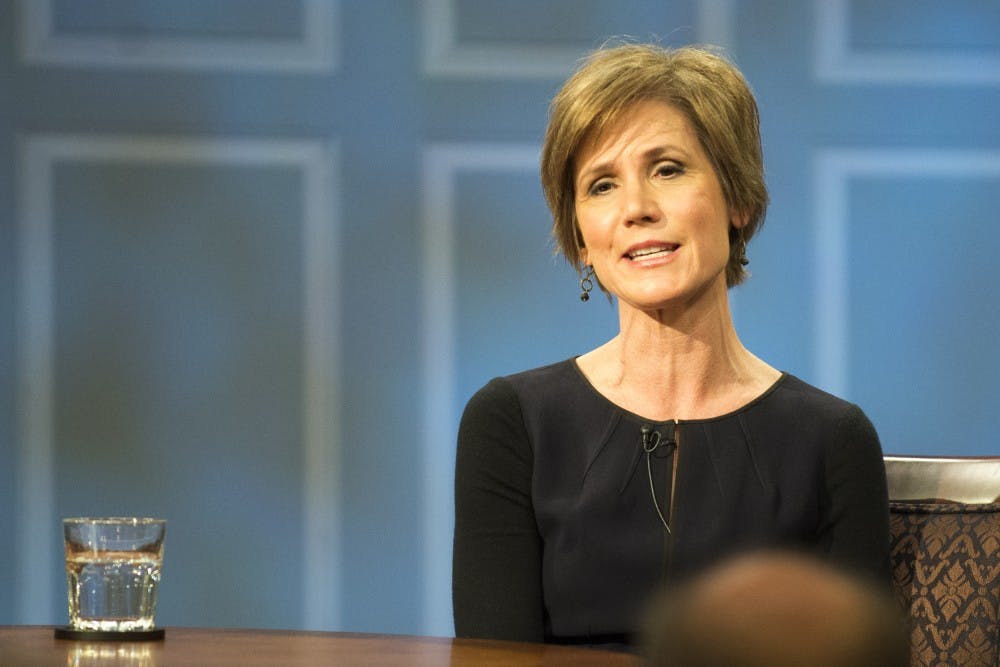Sally Yates, former acting U.S. Attorney General, spoke at the Miller Center Tuesday during a live taping of the center’s “American Forum” program. During the episode, titled “Standing Up to Donald Trump,” Yates talked about her time in the Department of Justice during both former President Barack Obama’s and current President Donald Trump’s administration with moderator Douglas Blackmon.
Yates had been the Deputy Attorney General from May 2015 to January 2017, and served as acting Attorney General from Jan. 20 to Jan. 30 last year upon the departure of former U.S. Attorney General Loretta Lynch. Her tenure as acting Attorney General was cut short when Trump dismissed her after she deemed his “travel ban” — an executive order that prohibited immigrants and refugees from seven predominantly Muslim countries — was unconstitutional.
The executive order, although shot down by federal judges in Virginia and other states, left those traveling from Iran, Iraq, Libya, Somalia, Sudan, Syria and Yemen stuck in ports of entry throughout the United States, particularly in airports.
Yates said she found out about the executive order from the only other Obama-era DOJ appointee who remained after the inauguration as Trump searched for a new Attorney General. She said her colleague had found out about it by reading The New York Times and that Yates had not received any prior notification of the order.
“If the travel ban were truly to address a national security issue, you would have thought there would be some consultation then with the national security experts,” Yates said. “That didn’t happen.”
Since Trump had signed the executive order on a Friday, she said she spent the weekend evaluating it and held discussions with DOJ appointees and lawyers where she decided that the department could not defend the order in court.
“At the end of [discussions with DOJ lawyers], I was not convinced that the travel ban was lawful or constitutional, she said. “Beyond that, I was convinced that to defend it would require me to send DOJ lawyers into court to argue something that wasn’t true — that was that the travel ban had absolutely nothing to do with religion.”
Yates also said she had thought about resigning upon deciding that the executive order was unconstitutional, but ultimately decided to stay.
“Once I had made the determination that I didn’t think it was lawful or constitutional ... That was the dilemma really ... do I stay or do I go?” she said. “Resigning would protect my personal integrity, but resigning doesn’t protect the Department of Justice.”
Yates also gained national recognition for warning the Trump administration that then-National Security Advisor Michael Flynn had lied to the FBI.
“It’s about a whole lot more than just one White House official lying to another,” she said. “Behind the compromise you have a situation where they haven’t been honest with the public about it.”
She also said she thought Trump has attempted to use the Department of Justice inappropriately to “go after a political foe” and protect allies. However, she said she thought his comments towards the DOJ and FBI have undermined public trust for the organizations and the Russia investigation.
“To me, the really core thing that’s happening here that can have an impact well beyond just the confines of this administration is not just the loss of confidence, but ... the attack on democratic institutions for political purposes,” she said.
Before Yates’ time in Washington, D.C., Obama appointed Yates as the U.S. Attorney in the Northern District of Georgia, where she served from 2010 to 2015. While serving as Deputy Attorney General, she wrote the “Yates Memo” on prosecuting executives for corporate crimes and oversaw the review of over 16,000 petitions related to drug clemency.
Yates called the drug clemency review a “mammoth undertaking” and said it was meant to reevaluate the sentences of nonviolent, low-level drug offenders whose sentences would likely be different based on laws today. The DOJ looked at different factors including prisoners’ backgrounds, potential histories of domestic abuse and conduct in prison to make clemency decisions, according to Yates.
“There was a life in every one of those folders that would be dramatically changed based on the President’s decision,” Yates said.
In the review process, Yates made recommendations to the White House counsel before final recommendations reached Obama. According to Blackmon, Obama commuted 1,927 clemencies and pardons.
Currently, Yates is a visiting professor at Georgetown Law. She said although she is beginning discussions on what she may do long-term, she has no plans to run for office.
When Blackmon asked Yates how she wanted to be remembered, she said she hoped she would be known as “somebody who really took the responsibility of representing the people of the United States.”
“I get that the vast majority of people know me only from the acts of the last 10 days,” Yates said. “I really view the last 10 days as a continuation of what I’ve been doing all along.”







